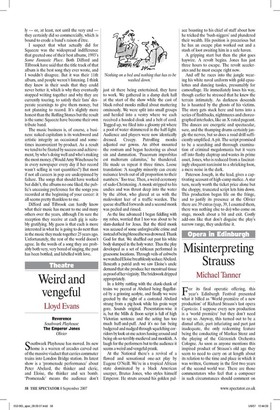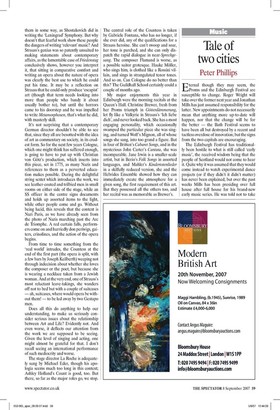Misinterpreting Strauss
Michael Tanner For its final operatic offering, this year's Edinburgh Festival presented what it billed as 'World premiere of a new production' of Richard Strauss's last opera Capriccio. I suppose every new production is a 'world premiere' but they don't need to say so. Anyway, this turned out to be a dismal affair, part infuriating and part just inadequate, the only redeeming feature being the conducting of Markus Stenz and the playing of the Garzenich Orchestra Cologne. As soon as anyone mentions this inspired product of Strauss's old age they seem to need to carry on at length about its relation to the time and place in which it was written, Germany in the first two years of the second world war. There are those commentators who feel that a composer in such circumstances should comment on them in some way, as Shostakovich did in writing the 'Leningrad' Symphony. But why doesn't that fearful work show these people the dangers of writing 'relevant' music? And Strauss's genius was so patently unsuited to making statements about contemporary affairs, as the lamentable case of Friedenstag conclusively shows, however you interpret it, that sitting in comparative comfort and writing an opera about the nature of opera was clearly the best use to which he could put his time. It may be a reflection on Strauss that he could only produce 'escapist' art (though that term needs looking into more than people who bandy it about usually bother to), but until the horrors came to his doorstep and he was impelled to write Metamorphosen, that's what he did, with masterly skill.
It's not surprising that a contemporary German director shouldn't be able to see that, since they all are besotted with the idea of art as commentary on society, in its crudest form. So for the next few years Cologne, which one might think has suffered enough, is going to have to put up with Christian von Gotz's production, which inserts into this piece, set in 1775, as many Nazis and references to them as a perverted education makes possible. During the delightful string sextet which introduces the work, we see leather-coated and trilbied men in small rooms on either side of the stage, while an SS officer in the centre signs documents and holds up assorted items to the light, while other people come and go. Without being lucid, this reveals that the context is Nazi Paris, as we have already seen from the photo of Nazis marching past the Arc de Triomphe. A red curtain falls, performers come on and hurriedly don periwigs, gaiters, crinolines, and the action of the opera begins.
From time to time something from the 'real world' intrudes, the Countess at the end of the first part (the opera is split, with a few bars by Joseph Keilberth) weeping not through indecision about whether she loves the composer or the poet, but because she is wearing a necklace taken from a Jewish woman. And at the very end, one of Strauss's most reluctant leave-takings, she wanders off not to bed but with a couple of suitcases — ah, suitcases, where would opera be without them! — to be led away by two Gestapo men.
Does all this do anything to help our understanding, to make us seriously consider serious issues about the relationship between Art and Life? Evidently not. And even worse, it deflects our attention from the work we are supposed to be seeing. Given the level of singing and acting, one might almost be grateful for that. I don't recall seeing an international performance of such mediocrity and worse.
The stage director La Roche is adequately sung by Michael Eder, though his apologia seems much too long in this context; Ashley Holland's Count is good, too. But there, so far as the major roles go, we stop The central role of the Countess is taken by Gabriele Fontana, who has no longer, if she ever did, any of the qualifications for a Strauss heroine. She can't swoop and soar, her tone is parched, and she can only dispatch the rapid dialogue in near-Sprechgesang. The composer Flamand is worse, as a possible suitor grotesque. Hauke Moller, who sings him, is clothed like a Rossini villain, and sings in strangulated tenor tones. And so on. Can Cologne do no better than this? The Guildhall School certainly could a couple of months ago.
My major enjoyments this year in Edinburgh were the morning recitals at the Queen's Hall. Christine Brewer, fresh from her Proms triumph in Gotterclammemng, let fly like a Valkyrie in Strauss's `Ich liebe dich', and never looked back. She has a most engaging personality, which occasionally swamped the particular piece she was singing, and turned Wolf's Mignon, all of whose songs she sang, into too grand a figure. But in four of Britten's Cabaret Songs, and in the mysterious John Carter's Cantata, she was incomparable. Jane Irwin is a smaller-scale artist, but in Berio's Folk Songs in assorted languages, and Mahler's Kindertotenlieder in a skilfully reduced version, she and the Hebrides Ensemble showed how they can immediately create the atmosphere for a given song, the first requirement of this art. But they possessed all the others too, and her recital was as memorable as Brewer's.




































































 Previous page
Previous page